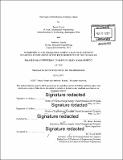The value of monitoring in supply chains
Author(s)
Tiwari, Tarun (Tarun K.); Toteda, Anthony
DownloadFull printable version (5.840Mb)
Other Contributors
Massachusetts Institute of Technology. Supply Chain Management Program.
Advisor
Bruce Arntzen.
Terms of use
Metadata
Show full item recordAbstract
Logistics providers process millions of packages daily and collect an incredible amount of data from these shipments. As new sensors are added to more and more packages, companies will now have increasingly fast access to even more data. However, how will logistics companies leverage this idea of big data to generate the most business value for their customers? Using a qualitative approach by interviewing current users of real-time monitoring devices, we were able to understand how customers perceive the value added by this technology. Moreover, we scoured a significant amount of literature on sensors, the logistics industry, and upcoming technological breakthroughs. We quickly discovered that customers do not perform extensive quantitative analysis to determine the trade-offs and financial benefit of using real-time sensors in their shipping processes. Additionally, we found that customers are unwilling to analyze this big data themselves, but instead want their logistics provider to interpret the data to provide value-added services. Therefore, logistics providers should leverage all of the data they collect, instead of simply creating value when shipments become exceptions, e.g. out of temperature range. We propose using smart contracts on a permissioned blockchain to automate business processes and reduce frictions within the shipping parties and other intermediaries.
Description
Thesis: M. Eng. in Supply Chain Management, Massachusetts Institute of Technology, Supply Chain Management Program, 2017. Cataloged from PDF version of thesis. Includes bibliographical references (pages 45-46).
Date issued
2017Department
Massachusetts Institute of Technology. Supply Chain Management ProgramPublisher
Massachusetts Institute of Technology
Keywords
Supply Chain Management Program.